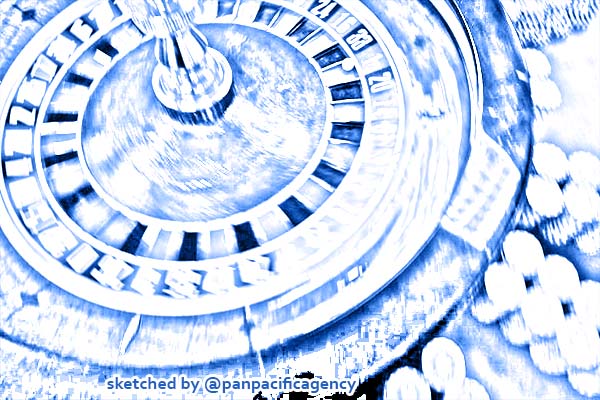Hokkaido pulls out of integrated resorts race in Japan

Japanese Prime Minister Shinzo Abe sees the integrated resorts as key to an economic and tourism windfall despite domestic concerns over gambling addiction. PHOTO: casino by AFP. Sketched by the Pan Pacific Agency.
TOKYO, Dec 1, 2019, The Straits Times. Hokkaido has withdrawn from the stiff race to host one of Japan’s first three integrated resorts (IRs), becoming the first prefecture that had previously cited interest to pull out, The Straits Times reported.
Japan’s northernmost island and largest prefecture has long earmarked a district in Tomakomai city, located just 20 minutes south of the New Chitose Airport by car, as its ideal site for an IR.
But Governor Naomichi Suzuki, who at 38 is Japan’s youngest prefecture leader, vetoed the idea on Friday (Nov 29), saying that there was just not enough time to address environmental concerns before making the bid.
He told the Hokkaido Prefectural Assembly: “While I relished the challenge of bidding for an IR, after careful deliberations, I have judged that it will be impossible to address outstanding environmental concerns before a bid must be submitted.”
Environmental activists have expressed concern that construction will hurt the area’s delicate natural eco-system, including a wildlife sanctuary near Lake Utonai. An environmental impact assessment is expected to take at least three years.
This means Hokkaido will miss the government timeline to submit an official bid between January and July 2021. Municipalities must demonstrate local political and business support, as well as include a detailed proposal. The three IRs – mega-complexes with casinos, hotels, shopping malls, entertainment facilities and exhibition spaces – are set to open around 2025.
Separately, a prefecture survey last week also showed that two in three Hokkaido residents were concerned about the IR project.
Mr Suzuki’s announcement was met with dismay by Tomakomai City Mayor Hirofumi Iwakura and the Hokkaido Economic Federation, though cheered by environmental groups.
Still, he said he will not rule out a future bid given the “immense potential” of an IR that coexists with nature. Japan is restricting IRs to only three sites for a start, but this will be put up for review seven years after the first approvals.
Japanese Prime Minister Shinzo Abe sees the IRs as key to an economic and tourism windfall despite domestic concerns over gambling addiction.
Japan aims to attract 60 million visitors and overall tourism spending of 15 trillion yen (S$187 billion) by 2030 – up from 31 million visitors and 4.5 trillion yen last year.
Hokkaido’s withdrawal leaves seven areas keen on an IR, going by a non-binding government survey in September. They are: Tokyo, Yokohama, Chiba, Nagoya, Osaka, Wakayama, and Nagasaki.
Forecasts show that the Japan market could surpass Macau and Las Vegas to become the world’s most lucrative casino market.
Mr Brendan Bussmann, director of government affairs at Las Vegas gaming and hospitality consultancy Global Market Advisors, told The Straits Times that IR operators like Hard Rock, Melco and Mohegan had already expressed interest in Hokkaido, and that it “will be interesting to see where they go”.
Given Hokkaido’s vast size, he wonders if local pressures could have been a reason behind the pullout, and if this could also lead other cities to think twice.
“If there is still a desire to host an IR in the region, Hokkaido could consider a site closer to existing developed areas like Sapporo, which is a great city that has a lot to offer.”